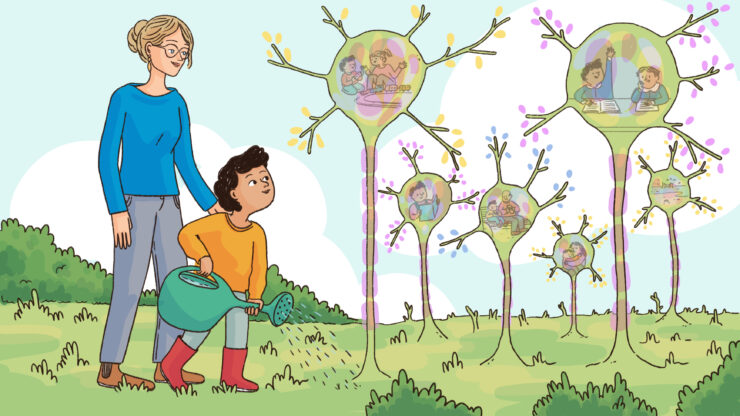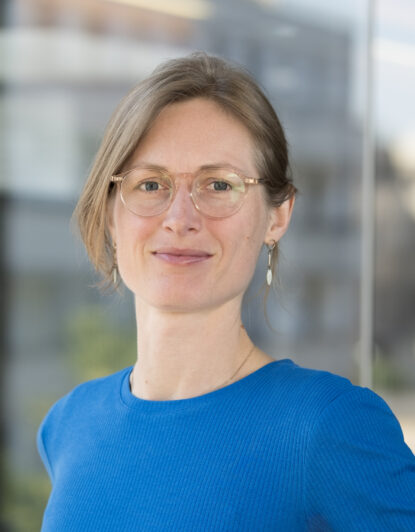The cognitive neuroscientist examining how developing brains respond to social experiences
Sofie Valk explores how our brains are shaped by both biology and the world around us

Sofie Valk seeks to inform policies and programmes to promote children’s mental and brain health. Aisha Schnellmann finds out more.
Aisha Schnellmann: What questions are you exploring in your research on biology and social influences?
Sofie Valk: The developing brain is remarkably plastic. It constantly changes in response to experiences. I study how biology and social experiences work together to shape the human brain, asking questions like: How does the structure of the brain support human cognition? How does the brain change as we grow from children into adults? And how does the social environment – which includes family, peers, and the broader community – impact the brain and cognitive processes?
“The developing brain is remarkably plastic. It constantly changes in response to experiences.”
My team and I aim to better understand how social and biological factors contribute to neurodevelopmental, psychiatric, and neurological disorders. Our research helps to explain how brain structure supports brain function, and how people around us shape our minds – insights that can inform both diagnosis and therapy.
We are currently focusing on development, since many social cognitive functions emerge in the first twenty years of life and are shaped by interactions with our environments. In the future, we also want to understand how development influences ageing processes later in life.
AS: Is it challenging to study the influence of social experiences on the brain?
SV: Yes, this research is particularly complex. It is difficult to collect data that meaningfully capture brain anatomy, functional processes, and social environments. To understand these things throughout the course of development, we ideally need to take a longitudinal approach, collecting data from the same children multiple times as they grow older.
We also need to connect different levels of understanding – from the cellular mechanisms in the brain to complex social interactions. Methodological innovations and interdisciplinary collaboration are needed to bridge these traditionally separate fields. It is a big challenge, but with the availability of open data resources, we have many opportunities to connect systems and scales.
AS: How will your research help children?
SV: A better understanding of how our social environment shapes the developing brain will help us identify key biological mechanisms at the intersection of social and neural systems. Ultimately this may lead to more informed decision making and policy changes that promote children’s mental and brain health. For example, our research on how social factors affect neural plasticity could inform the design of educational environments that build resilience. It could also raise awareness of the critical importance of nurturing the developing brain, supporting stronger protections for children’s rights, mental health, and overall wellbeing.
I am also applying my research in practical ways. Together with my team, I mentor high school interns who run scientific projects in our lab. In doing so, they gain hands-on experience in coding, neuroscience, and critical thinking. Another focus of my lab is to understand how our model is relevant in a clinical context, mainly for the fields of psychiatry and neurology. We are studying how early life stress may impact neurodevelopment and functional outcomes, for example, and how risk and resilience align with brain development and mental health.
“Adults can nurture children’s natural curiosity about how their minds and bodies work.”
AS: How can adults support healthy brain development in children?
SV: Adults can nurture children’s natural curiosity about how their minds and bodies work. They can create healthy, supportive environments essential for optimal brain development for children both at home and in school. This includes reducing environmental stressors, whether psychosocial, like chronic stress or neglect, or physical, such as noise or pollution.
When teachers and policymakers have increased awareness of the brain’s plasticity and the unique opportunities it presents during childhood, it can help strengthen practices and policies that protect children’s rights.
In schools, it’s important to place as much emphasis on soft skills – like emotional understanding and perspective taking– as on hard skills like math and writing. These social-emotional competencies are central to healthy development and long-term mental health.
Finally, ongoing dialogue between researchers, policymakers, educators, and families plays an essential role in supporting children’s development, especially as we navigate the challenges of a rapidly changing, digital world.
“Ongoing dialogue between researchers, policymakers, educators, and families plays an essential role in supporting children’s development.”
AS: What are you excited to be working on right now?
SV: Our research team is developing new methods to investigate how the brain supports social functions and responds to different social environments. These approaches aim to reveal how specific factors, like positive peer interactions, challenging social situations, or the environments children live in, are reflected in brain structure and function, and how they shape neural development over time.
By better understanding the impact of different types of social experiences, we hope to inform the design of more effective social-emotional learning programs for schools and also contribute to improved diagnostics and therapeutics in clinical settings.
Lately, I’ve also been thinking more about how to translate our research into practice. Together with my team, we’re developing a STEM educational program that connects lab-based neuroscience with classroom learning. This idea is to introduce children to coding, neuroscience, and social psychology in accessible, engaging ways. My hope is that when students learn how their brains process social information, they will become more reflective about their own thoughts, emotions, and interactions.
Footnotes
Sofie Valk studied artificial intelligence and social philosophy for her BSc at the University of Amsterdam, and cognitive science for her MSc. She earned a PhD in social brain structure at the Max Planck Institute for Human Cognitive and Brain Sciences in Leipzig, Germany, and then completed a postdoctoral fellowship in imaging genetics at Heinrich Heine University Düsseldorf. She subsequently formed the Otto Hahn research group on ‘Cognitive Neurogenetics’ at the Max Planck Institute for Human Cognitive and Brain Sciences, as well as a research group on the same topic at Forschungszentrum Jülich. She currently heads the group at the Forschungszentrum Jülich as well as the Lise Meitner group ‘Neurobiosocial’ at the Max Planck Institute for Human Cognitive and Brain Sciences. She has received various awards and recognition for her work, including the Otto Hahn Medal and Award, the Hector Research Development Award, and the Early Career Award from the German Society of Psychophysiology and its Applications. She has two children. Sofie is a 2025-2027 Jacobs Foundation Research Fellow.
Sofie on LinkedIn and Bluesky. Sofie’s lab website.
This interview has been edited for clarity.

